As it was mentioned before, Polotsk State University hosted the professors from the University College of Teacher Education – Carinthia (Klagenfurt, Austria) Pia-Maria Rabenschteiner and Gerhart Rabenschteiner. One of the main parts of their visit was the panel discussion with the lecturers of PSU. We have spoken about the matter with one of the organizers and participants of the event, Denis A. Kondakov, Dean of the Faculty of Humanities, Associate Professor and PhD in Philology.
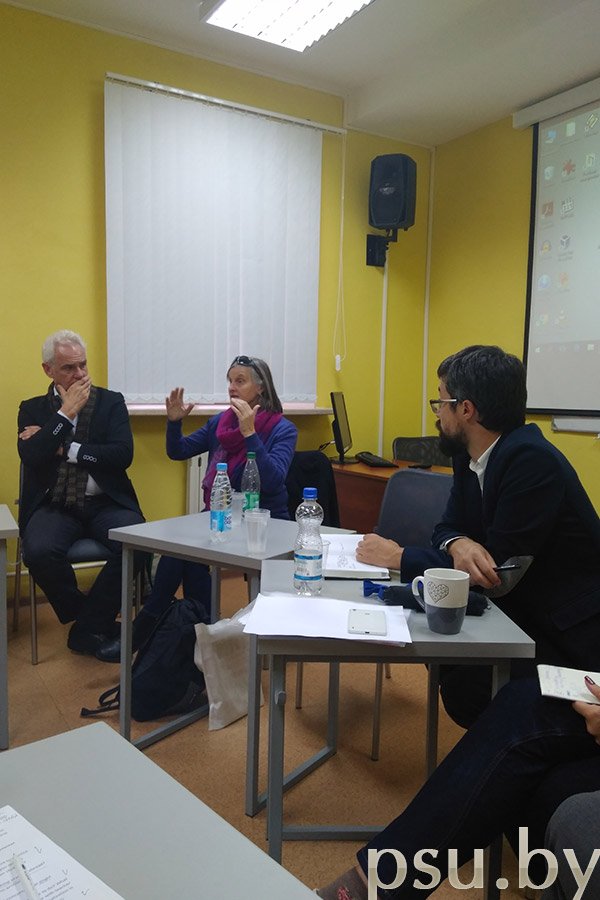
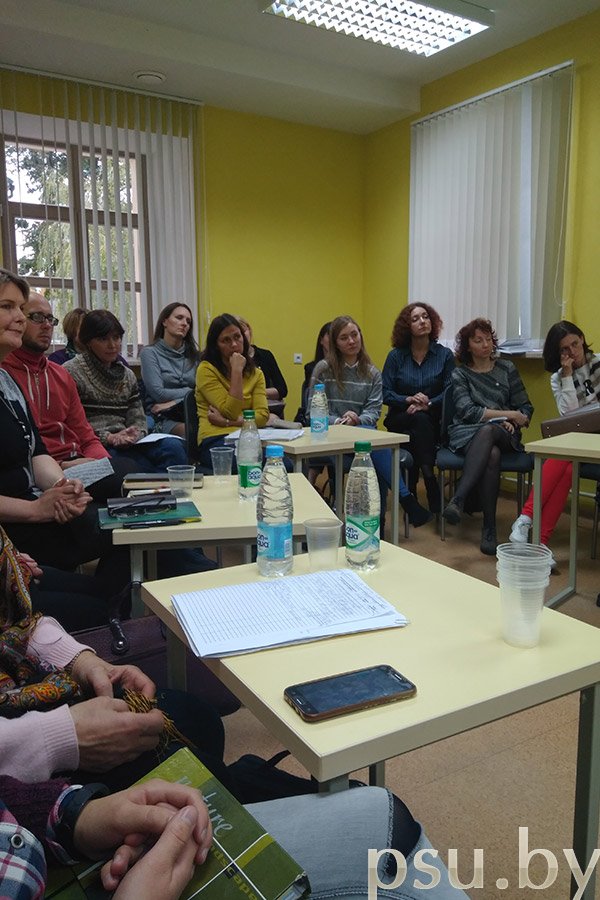
Interviewer: Tell us, please, why the format of a panel discussion was chosen? What did the Austrian and Belarusian colleagues discuss?
D. A. Kondakov: The meeting in a form of a modern panel discussion is a common practice for our European colleagues. It allowed us to learn more about our partners from Austria, tell them about our university, discuss common professional interests and find points for the establishment of beneficial cooperation. The moderator was Yelena Potapova.
Interviewer: What did they talk about?
D. A. Kondakov:Firstly, our Austrian guests gave a small tourist review of their picturesque region. Secondly, they shared their experience in international students education under international academic exchange programs. It is clear that our Austrian partners have significant advantages. For example, their geographical position allows them to offer their students to have breakfast in Klagenfurt, have lunch in Slovenia and then drink a cup of coffee in Italy! Moreover, the small size of the city (around 100 thousand people) and of the University creates a family atmosphere. Of course, such a city attracts the attention of both European and non-European students. Some of them, according to the words of my colleagues, try to use the program not so much to enrich their knowledge, but to organize their pastime. Things happen!
The University College of Teacher Education in Austria has been practicing in the academic mobility program for about twenty years. Despite all the differences between us, we have a lot to learn from them! It was interesting to see how the semester academic course for international students is organized. They presented disciplines included in the curriculum.
Thirdly, Pia-Maria Rabenschteiner and Gerhart Rabenschteiner gave a detailed description of the education forms that they use to prepare the students for undertaking a teaching internship. This can be applied to the work with international students, because they also need a special preparation. Such practice, of course, can enrich educational experience and the teaching tools of international students studying in Klagenfurt.
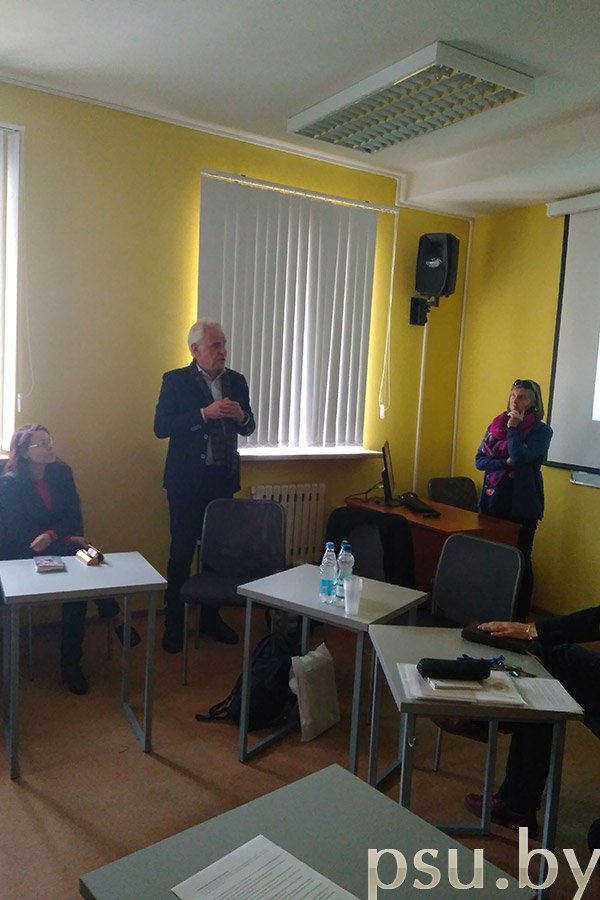
Interviewer: Such pedagogical practice would be useful for the students of Polotsk State University as well!
D. A. Kondakov:It definitely would! Preparing the basis for the improvement of the organization and holding teaching practices and students exchange together with Austrian colleagues, we, the lecturers of PSU, are practically oriented. Moreover, knowing the innovative examples of teaching and upbringing in Austria can help our graduates to make an informed choice in favor of a pedagogical career.
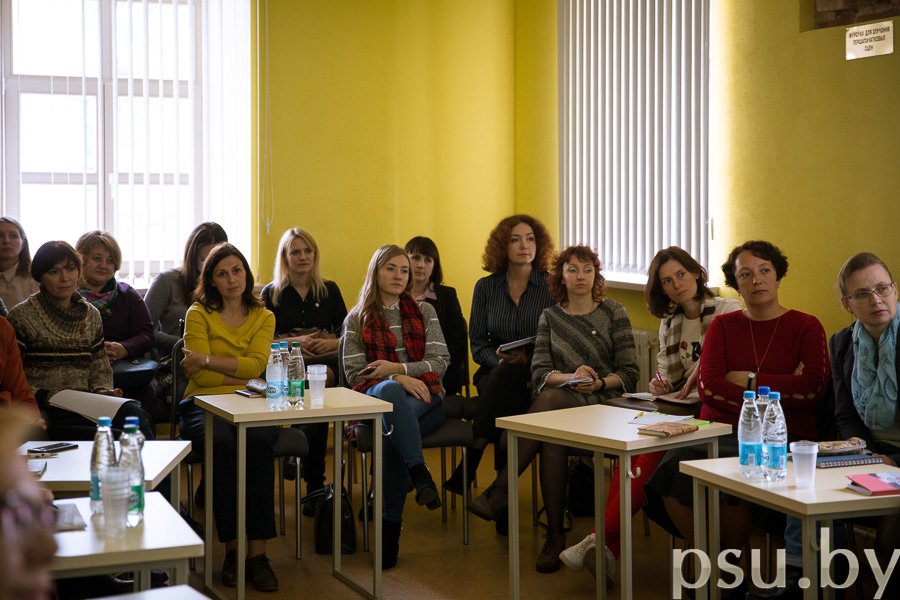
Interviewer: What were PSU representatives talking about?
D. A. Kondakov: We talked about the Faculty of Humanities and about the main directions of international activity. In our presentation, special emphasis was on the specialists in the sphere of pedagogy because our Austrian guests represented the University College of Teacher Education.
Yauhen Papakul, who is in charge of international activity at the Department of World Literature and Foreign Languages, presented our colleagues’ and students’ achievements in this sphere. Olga V. Zhuravskaya spoke about the activity of the Centre for foreign Languages Study: the number of groups and students, the languages taught and the teaching techniques used. Margarita M. Sirotkina, a lecturer experienced in international mobility including the internship at the University College of Teacher Education, talked about the methodical and pedagogical disciplines taught at the Faculty of Humanities. Besides, she gave a talk about two methods of teaching: for the international students and for the students of the pedagogical specialties at our university. We also invited the representatives of the Department of Technology and Methods of Teaching to the discussion: Irina N. Andreyeva and Svetlana V. Ostapchuk.
There were other reports made by my colleagues. At the end of the main part, we exchanged questions as usual. Our education system is a real terra incognita for the Austrian guests! A lot of our realia surprised them. For example, they were surprised that our students specializing in Romance and Germanic Philology had to study for 5 years earlier.
I hope that the professors from the University College of Teacher got the idea of how the Faculty of Humanities works and what Polotsk State University is. I believe it will help us and our Austrian partners understand each other better and solve the problems more rapidly.
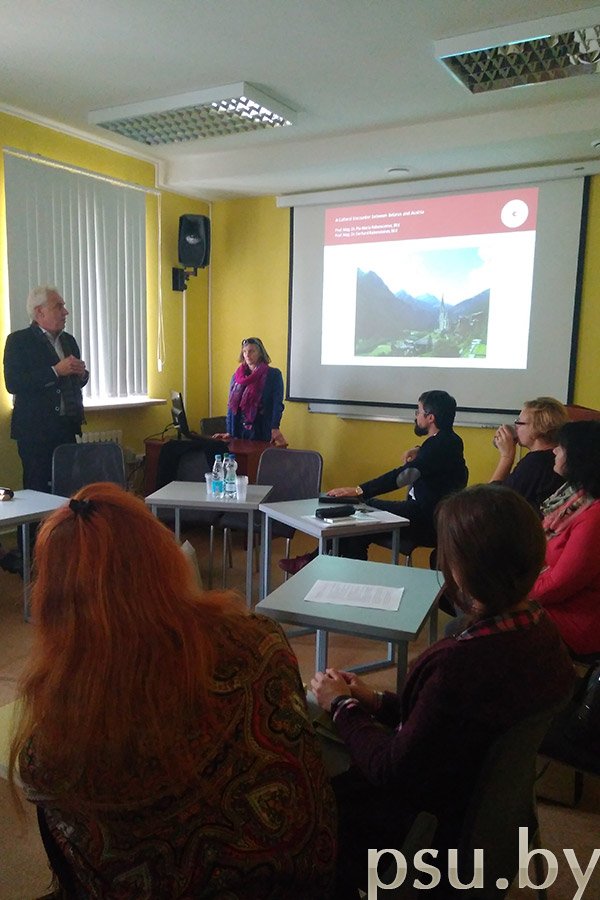
Interviewer: Are there any specific results of the discussion?
D. A. Kondakov:Of course there are! The most important is that we have found common interests! One of the main results of the panel discussion is the creation of thoroughly developed academic mobility programs for international students at PSU. Today we invite international students to study, but we can offer them only ordinary bachelor and master’s programs of education. It is necessary to follow the example of our Austrian colleagues: they have special semi-annual programs for those who come to study under the existing international mobility programs. The groups are made of international students only. Thus, we need to make our courses meet the requirements of our European partners.
During the panel discussion, we saw that our university has opportunities to implement such programs. The experience of the University College of Teacher Education will be very useful in realizing our potential.
Moreover, I see good prospects for the joint organization of pedagogical practices. Here we have experience. The Faculty collaborated with Växjö University (Sweden) successfully. Both the master’s and bachelor students of the University in Sweden came to Belarus to have practice at Polotsk and Novopolotsk schools. It is very interesting and we are planning to renew that practice together with our Austrian partners.
Our students will have the opportunity to have pedagogical practice at educational establishments of Austria as well. It is a completely different challenge indeed! It is not easy for any student to do practical training at an enterprise or at school feeling great responsibility. There will be even higher requirements to you as a teacher, because you will have to work in a different language. This, meanwhile, will be a great motivation for our students to take the theoretical knowledge more seriously here, at Polotsk State University. Moreover, it will be a motivation to self-education.
Interviewer: To get an internship or practice in Austria, our students will have to demonstrate a good command of English or German language!
D. A. Kondakov:That is right! The common requirement for all academic mobility programs is the knowledge of a foreign language! This can be either English or German, but the level should not be less than B1. It is good that there are lecturers who know the languages, but we have to work with the students to meet this requirement.
Our Austrian colleagues are very interested in the disciplines of the philological specialties. Nevertheless, the students specializing in Pre-school Education and Practical Psychology can participate in the program of academic mobility as well.
Interviewer: A series of other events took place during the visit of our guests from Austria, didn’t it?
D. A. Kondakov:Sure! The program was very busy. It was not limited to the panel discussion only. The guests provided lectures for bachelor, master’s students at the Faculty of Humanities and for the people who study at the Centre for Foreign Languages Study. Without any doubt, the visit of Pia-Maria Rabenschteiner and Gerhart Rabenschteiner to PSU will make the contacts between our Universities stronger. Moreover, our lecturers are visiting the University College of Teacher Education soon and we hope to move on to the joint realization of large international projects with our Austrian partners.
Interviewer: Vladimir Filipenko